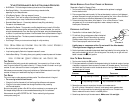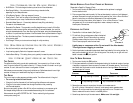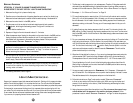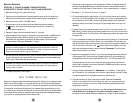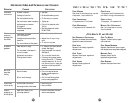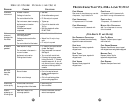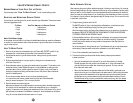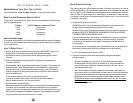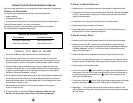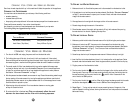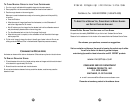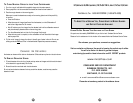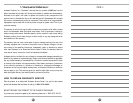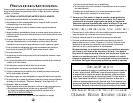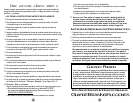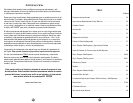
17
TO DELIME THE WATER RESERVOIR:
1. Make sure the unit iis off and that the power cord is disconnected from the electrical outlet.
2.
If the appliance is cool and the pressure has been released, (See Section
“CAUTION: PRESSURE”
on Page 7)
remove the reservoir cap and pour 8 ounces of fresh, undiluted white household
vinegar into the water reservoir.
3. Allow appliance to sit overnight with the vinegar solution in the water reservoir.
4. Discard vinegar through the reservoir of the machine.
5. Rinse the water reservoir thoroughly with tap water by filling it with water and then pouring
the water back out into the sink, repeating this step twice.
TO D
ELIME INTERNAL PARTS
:
1. Make sure you delime the inside of the water reservoir first by following the previous steps.
2. Make sure all controls are OFF, the power cord is disconnected from the electrical outlet,
the appliance is cool and all pressure in the espresso machine has been released.
(See Section
“CAUTION:PRESSURE”
on Page 7).
Pour 8 ounces of fresh undiluted white household
vinegar into the water reservoir.
3. Screw the cap back on top of the espresso water reservoir. Make sure the cap is on tight.
4. Insert the filter into the brew basket and place it in its locked position on the appliance. Center
the carafe under the brew basket nozzle. Insert the glass carafe in place with lid on the drip tray.
5. Plug the power cord into the electrical outlet.
6. Turn the control knob to the position and allow the vinegar to flow into the carafe until the
2 serving mark. Place a cup with cold water under the frothing aid. Insert the frothing tube into
the water and slowly turn the control knob to the position. After 15 seconds turn the
control knob to the
Off
position.
7. Turn the control knob to the position. When all the vinegar has been pumped into the carafe
and the flow has stopped, turn the control knob to
Off
and allow the appliance to cool.
8. Repeat Steps 1 – 7 using only tap water to rinse any remaining traces of vinegar out of the
machine. Repeat this rinsing process, allowing the machine to cool and pressure to be released
before each rinsing.
16
CLEANING YOUR COFFEE AND ESPRESSO MACHINE
Over time, mineral deposits built-up in this machine will affect the operation of the appliance.
CLEANING THE COFFEEMAKER
Your machine must be cleaned when you notice any of the following conditions:
• excessive steaming
• increased brew cycle times
• the pumping action stops before all of the water has been pumped from the water reservoir
These conditions are caused by lime or other mineral deposits.
How frequently you clean your machine depends upon the hardness of your tap water.
The following table gives suggested cleaning intervals.
S
UGGESTED
C
LEANING
I
NTERVAL
TYPE OF
WATER CLEANING FREQUENCY
Soft Water (Filtered Water) Every 80 Brew Cycles
Hard Water (Tap Water) Every 40 Brew Cycles
CLEANING YOUR ESPRESSO MACHINE
1. Turn the unit to
Off
and unplug the power cord from the electrical outlet.
2. The frothing tube may still be hot, do not touch it with your hands until it has cooled.
Remove frothing aid and wipe frothing tube with a damp cloth. Using the wrench built into
the measuring spoon, unscrew the frothing aid and clean valve with a needle or toothpick.
3.
The carafe, carafe lid, filter, brew basket and drip tray can be washed with soapy water
or placed on the top rack only of your dishwasher.
CAUTION:
Do not immerse appliance
in water. Do not remove reservoir cap or brew basket while appliance is under pressure.
See Section
“CAUTION: PRESSURE”
on Page 7.
4. After the pressure has been released, remove reservoir cap. Discard the remaining water through
the top opening of the water reservoir by turning the
applianc
e upside down over the sink.
Always empty the water reservoir of any water between uses. Do not immerse
applianc
e in water.
Screw the
reservoir cap
back in place.
5. Wipe housing with a soft wet cloth. Do not use abrasive cleaners or scouring pads
as they will scratch the finish.
6. Do not store the filter in the brew head.
This can adversely affect the seal
between the brew head and the filter while brewing espresso
.



